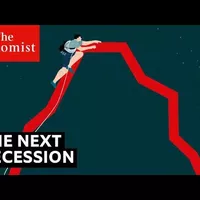How to prepare for the next global recession
We focused on this now because it's been a decade since the global recession of
2008-2009 and some interesting and and worrying vulnerabilities are also popping up at the moment
In 2008 and 2009
The dominoes were really set up for quite a nasty financial and economic crisis this time
The economic vulnerabilities aren't quite as large
They're large enough that we could see a slowdown in GDP growth and a slowdown in trade and things of that nature
the real risk, is that our lack of preparedness and
the the lack of room for global cooperation
Will turn what starts as kind of a minor downturn into something much larger and much more difficult to deal with sometime the next year
or two
The last big global downturn began in the United States with the collapse of the housing bubble in the financial sector there
next time the trouble is much more likely to start elsewhere and perhaps
In the emerging world. Emerging economies are a much larger share of global output than they used to be
They've also gone on something of a borrowing binge over the last ten years, which means that they could be due for a reckoning
There are also reasons to be concerned about
the euro area and in particular Italy which has an enormous public debt problem and
where markets have been feeling a bit jittery about their ability to pay that back and that could relaunch the euro area debt crisis that
We saw about a half decade ago
The tools government's normally used to fight a recession won't be available in the same way that they normally are the next time around
Interest rates will be very low and so we normally rely on central banks to do interest rate cutting to perk up
Spending break up growth and they're not going to be able to do that. So pretty quickly
They're gonna have to turn to less tested methods money printing to buy bonds
Quantitative easing was something that was used last time that's going to be used again
But that works in a much more uncertain way and is much more politically contentious than some of the tools that are ordinarily used
Within countries the problem is that government is much more polarized across the world
You have many more populist parties nationalist parties and it's going to be very hard to reach the agreement. That's
Necessary to launch big spinning programs and of that nature, then you also have disagreements across countries
Which means that it's much more likely you have
Contentious policies tariffs that go up currency wars things of that nature as countries struggle to deal with the next downturn
Ideally governments would be taking some steps right now to get ready for the next recession
They should be changing their central bank policy targets
What we've learned is that a low inflation target doesn't give central bank's enough room to fight recessions before interest rates fall to zero
They should also be getting their budgets ready, which means preparing
to include measures that will increase spending automatically when the economy weakens in the future so that they don't have to have to have
fights in Parliament about whether or not to expand spending when the time comes but then most important of all I think governments need to
Coordinate their responses with each other that makes it much more likely that we don't enter a scenario like we did in the 1930s
When tariff barriers went up when there were currency wars and competitive devaluations
and when ultimately that led to some pretty significant and nasty geopolitical tension

